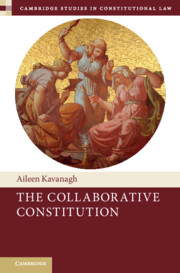Book contents
- The Collaborative Constitution
- Cambridge Studies in Constitutional Law
- The Collaborative Constitution
- Copyright page
- Brief Contents
- Contents
- Acknowledgements
- Abbreviations
- Introduction
- Part I Institutions and Interactions
- Part II Rights in Politics
- Part III Judge as Partner
- 7 Judge as Partner
- 8 The HRA as Partnership in Progress
- 9 Calibrated Constitutional Review
- 10 Courting Collaborative Constitutionalism
- Part IV Responsive Legislatures
- Bibliography
- Index
- Books in the series
7 - Judge as Partner
from Part III - Judge as Partner
Published online by Cambridge University Press: 12 October 2023
- The Collaborative Constitution
- Cambridge Studies in Constitutional Law
- The Collaborative Constitution
- Copyright page
- Brief Contents
- Contents
- Acknowledgements
- Abbreviations
- Introduction
- Part I Institutions and Interactions
- Part II Rights in Politics
- Part III Judge as Partner
- 7 Judge as Partner
- 8 The HRA as Partnership in Progress
- 9 Calibrated Constitutional Review
- 10 Courting Collaborative Constitutionalism
- Part IV Responsive Legislatures
- Bibliography
- Index
- Books in the series
Summary
This chapter argues that the role of the judge in the collaborative scheme is not to be the faithful agent to the legislature, but rather that the courts should be constructive partners to the legislature in the constitutional scheme, where they are both oriented towards the common goal of achieving good government under the constitution, albeit in their own role-specific ways. In charting the active and creative role of the courts in the constitutional scheme, the chapter emphasises the epistemic and institutional constraints under which courts labour. It also highlights the active and valuable contribution they make to the constitutional system as a whole. The final section of the chapter examines ’the principle of legality’, namely, the presumption of statutory interpretation employed by Anglo-Commonwealth courts that they will read statutory provisions as compliant with rights, unless the contrary is made crystal clear in the statutory language. It is argued that, though ’the principle of legality’ is a powerful judicial tool which judges can use to ensure that rights are protected, it can operate in ’representation-reinforcing’ and even ’democracy-enhancing’ ways.
Keywords
- Type
- Chapter
- Information
- The Collaborative Constitution , pp. 205 - 229Publisher: Cambridge University PressPrint publication year: 2023



